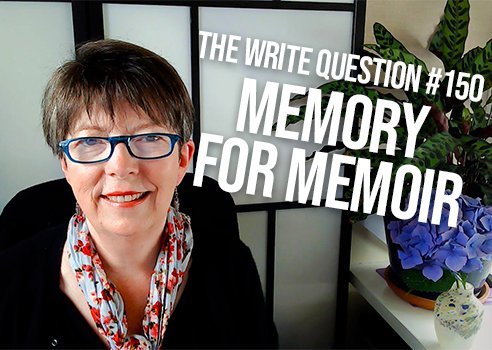Viewing time: 5 mins 16 secs.
The Write Question is a weekly video podcast about writing that I started in 2017 and that ran, more or less weekly, until April 2022. This is a republication of issue #150, which discusses how to use your memory for memoir. The post first ran on Aug. 7/20.
Transcript:
How do you use your memory for memoir? That’s the topic I’m addressing today in The Write Question. I’m Daphne Gray-Grant, the Publication Coach, still in pandemic mode.
I have a question from Brenda Gibson, a writer based in Dayton, Ohio. Here’s what she’s asked by email…
“I’m trying to write a memoir about my marriage to a wonderful man and his long journey with cancer. I’ve written probably 25 percent. I have the opening chapters and I’ve written the ending. It’s the in-between that gives me anxiety. My problem is that when I try to recall certain memories, not enough details come back. I get anxious, worried and frustrated. If I knew that the memories would come back with greater clarity — if I kept pressing on — maybe it would be easier, but I’m afraid that they will never come back in great enough detail. Any suggestions?”
Thanks for your really important question, Brenda, which arrived at my desk on the heels of another video about memoir I did recently, link below.
Here’s the important thing to understand about memoir: even though it is non-fiction, it needs to be written very much like a novel. For example: there should be:
- plot
- interesting characters for readers to care about
- scenes
- tension, and rising action
- character arcs — in which the characters change over time.
Doesn’t that sound like something you learned about in grade 10 English class? The bottom line is that you’re writing a novel — but it’s based on truth. And like any good novelist, you need to use your imagination to make up the details you can’t remember.
Some people have a hard time believing that it’s acceptable to use your imagination for a memoir, but of course it is. The book is YOUR memory of a certain part of your life. It is through your eyes.
And if this attitude bothers you, consider including an explanatory note in your preface. You could say something like, “my memoir is based on my recollections of the past 30 years. When I couldn’t recall specific dialogue, I worked to make it true to my emotional memory and I checked my recollections with others involved.” Or something like that.
I have read many memoirs and I’ve seen writers include dialogue from when they were five years old. Do you think they actually remembered that dialogue word for word? Of course not! They made it up. But the rule with making things up is that they need to be true to the spirit of what you remember.
Here’s another essential point: Don’t fret about the dull and mundane details. You don’t need to remember what you made for dinner on August 15th, 1992. Nor do you need to recall what your husband gave you for Christmas that year. But if something IMPORTANT happened, you will remember it. Reconstruct those feelings and mine them for everything you can recall.
Here’s where mindmapping can help you. I’ve written many blog posts and shot several videos on mindmapping. See a link to all this material in the show notes below.
Another important aspect of “novelizing” your life relates to nailing down the scenes. If you can’t remember specific locations, do some research. Ask others about what they remember. And, if you can, go back and visit certain locations — perhaps houses you used to live in, schools your kids attended or hospitals your husband had to visit. There is no shame in doing this type of research! In fact, it’s a clear part of the job of being a writer.
My husband — who has a background in sciences — is currently writing a memoir of his early life for our kids. He’s going through boxes of old photographs and family records. These records stir his memory and remind him of incidents he might otherwise have forgotten. He also knows that his brother has a better memory than he does, so he calls his brother all the time to check on facts.
Brenda, I know it might seem ironic that you have to do research on your own life, but that’s just the reality of being a writer. Research is just as important as the writing.
Finally, let me wrap up with a quote from the late Polish-American writer Isaac Bashevis Singer. “The true story of a person’s life can never be written. It is beyond the power of literature.”
Brenda, I’m confident that your memory will improve as you start to do some more research. Don’t imagine that research is just about thinking. It also involves talking to others, visiting locations, looking at photographs and old records.
*
If you’d like to learn more about how to make writing a happier and more rewarding process, check out my latest book Your Happy First Draft. I don’t sell it in bookstores or via Amazon. The only place to buy it is on my website, link on the screen below and in the show notes.
Links
How to write about your life (video)


